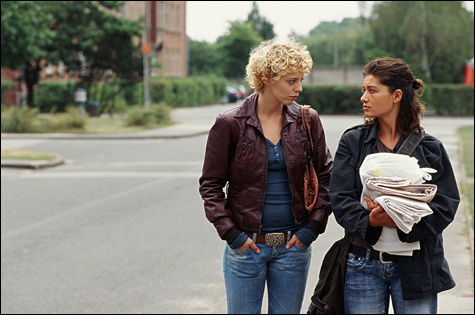
Patrycja Ziólkowska and Nurgül Yesilçay
|
Maybe opening this year’s Boston Turkish Film Festival with a movie by Fatih Akin is the festival’s way of calling attention to Turkey’s hopes of joining the European Union. But the German-born director has always expressed ambivalence about his divided heritage, and this film is no exception, as the border between one country and culture and another blurs before snapping back into an uncrossable frontier. Such blurring distinguishes Akin’s narrative structure as well — it’s a better-than-usual version of the current popular multiple-story-line format. Leaving little to suspense, he titles the film’s first two chapters “Yeter’s Death” and “Lotte’s Death.”
How Yeter (Nursel Köse) and Lotte (Patrycja Ziólkowska) die, however, is not so predictable. The 50ish, Turkish-born Yeter earns her keep in Bremen’s red-light district until fundamentalist thugs demand she “repent.” Rather than comply, she takes up an offer from Ali (Tunçel Kurtiz), a Turkish widower, whose professor son Nejat (Baki Davrak) grudgingly approves. After Yeter’s demise, Nejat heads to Turkey to find her estranged daughter, Ayten (Nurgül Yesilçay). Lotte, meanwhile, bumps into Ayten — who’s penniless and in flight from Turkish authorities for her radical political activities — in Bremen, on the university campus. Lotte’s mother (Hanna Schygulla, old and stout but still æthereal) grudgingly approves. Not so much the authorities. Lotte ends up in Istanbul in search of something elusive and fatal.
The final chapter, “The Edge of Heaven” (the actual translation of the film’s German title, “On the Other Side,” is more evocative), reorients the overlapping chronologies and underlines how they brush up against each other. Although some of the stretched coincidences and “ironic” missed chances might have made Kieslowski wince, Akin doesn’t succumb to Babel-like patness. (One scene involving children and a firearm seems almost a direct allusion to Iñárritu’s glib diatribe.) Instead of clinging to safe platitudes, his stories venture into the borderless realm of love, loss, and reconciliation. German + Turkish + English | 122 minutes | MFA: March 27